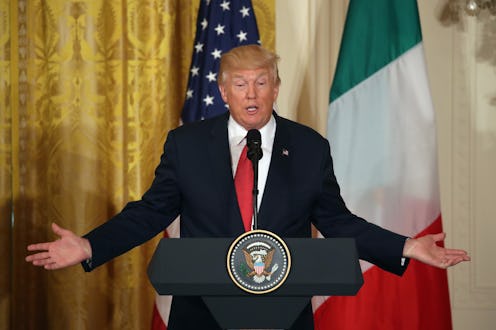News
Trump Says Republicans' New Health Care Bill Is "Really, Really Good"

According to scattered reports, Republicans are trying to resurrect President Trump's failed health care bill from the dead. Negotiations between moderate and conservative House Republicans are underway, and on Thursday, Trump said the new Republican health care bill has "gotten really really good" because of those negotiations. However, none of the text of the new bill has been released, and it's unclear why House Republicans would be able to strike a compromise on health care now after proving incapable of doing so in March.
"[W]e’re doing very well on health care," Trump said at a press conference with Italian Prime Minister Paolo Gentiloni. "We’ll see what happens. But this is a great bill. This is a great plan, and this will be great health care. It’s evolving.”
The GOP has made repealing Obamacare one of its top legislative priorities for years, and yet despite controlling all three branches of government, it has not been able to do so. So, what's changed? Well, according to the Huffington Post, conservative and moderate Republicans have struck a tentative agreement that could appease both wings of the party. Per the compromise, moderate Republicans would agree to let states opt out of Obamacare's community rating provision, which would permit insurance companies to charge higher premiums to Americans with pre-existing conditions. In exchange, more conservative Republicans would agree to reinstate Obamacare's Essential Health Benefits, a provision that outlines the minimum coverage requirements for health plans and which had been repealed in an earlier iteration of the bill.
That sounds promising — until you dig a bit deeper into the details. For instance, moderate Republicans were supposedly represented in the negotiations by Rep. Tom MacArthur. And yet according to Politico, MacArthur didn't actually obtain the blessing of those moderates before agreeing to the changes, and as a result, several of them are "incensed."
"The [compromise] doesn't address the things that I had concerns about — the things I think are detrimental to the people I represent," Rep. Dan Donovan, a moderate New York Republican who says he's a "no" on the bill, told Politico.
Moreover, the text of the new bill hasn't been released yet, and it hasn't been scheduled for a vote. Trump says that he's hopeful a vote will occur before April 29 — the 100th day of his presidency. And yet multiple House Republican sources told Politico that this is unlikely, as the House is currently in recess and doesn't return until four days before that deadline.
"The question is whether it can get 216 votes in the House, and the answer isn't clear at this time," a senior Republican aide told Business Insider. "There is no legislative text and therefore no agreement to do a whip count on."
In my opinion, the fundamental reason why Trumpcare 1.0 failed had little to do with the bill, and everything to do with the ideological makeup of the House Republican caucus. There simply isn't enough agreement among elected Republicans as to what health care policy in America should look like. I, for one, am not convinced that rewriting components the bill, or insisting that it must be passed before Trump's first 100 days, is going to change that.